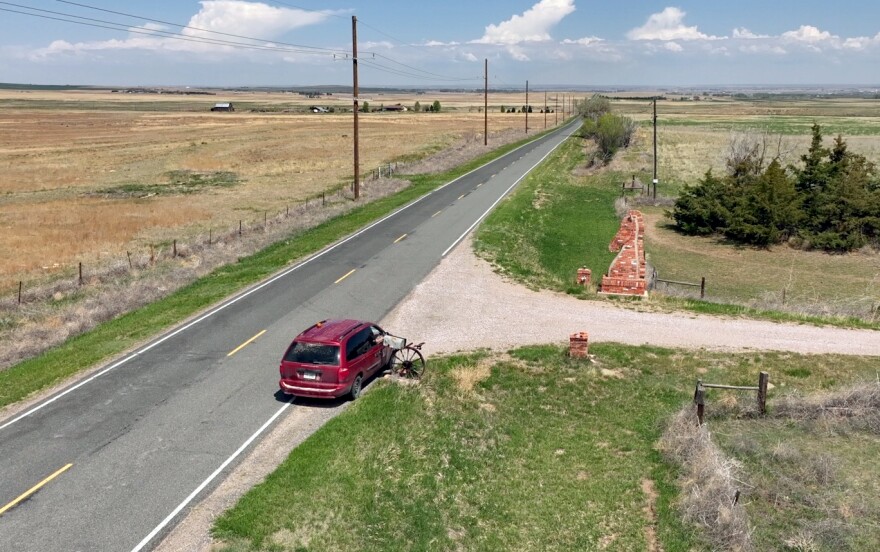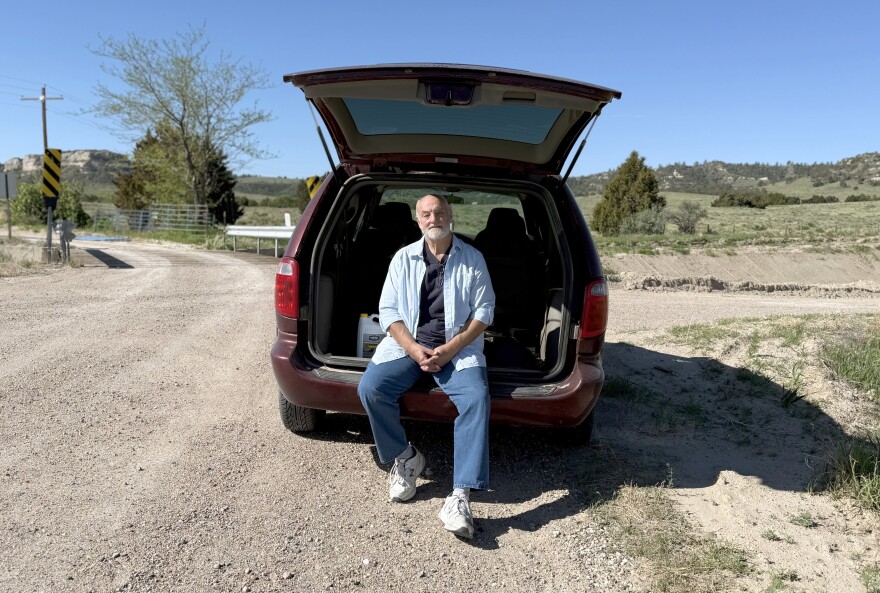Rural letter carrier Roger McDonald missed driving his 150-mile route outside Scottsbluff in northwestern Nebraska earlier this year. He was injured in a serious car accident that kept him from mail delivery for three months. He had an appointment scheduled with the doctor who rebuilt his right hand on May 8, so he decided to do a dry run the day before in case he was cleared to return.
As the pavement turned to gravel on Crow Road, McDonald said long distances, low population density and poor infrastructure make rural delivery difficult and unprofitable. His point was soon proven. Among the route's first stops are two mailboxes separated by a dilapidated bridge over an irrigation canal. Before the bridge was closed, it was a 50-yard trip between them, McDonald said at the first mailbox. He then drove nearly three miles to reach the second.
Under the universal service obligation, which mandates mail delivery to every address in the country, a rural letter carrier will drive more than 700 miles to serve those two households in a normal year.
"It's never going to make financial sense," said McDonald, 61, from the driver's seat of his preferred delivery vehicle, a Dodge Caravan. "But that's a big reason why the universal pricing system was generated. Because we knew we had to service every American's home, not just the Americans' homes that provide us a profit."
As a government agency providing a public service, the U.S. Postal Service is not required to make a profit. But it is not supposed to lose money, either, which it has done every year since 2007, according to its annual reports. The inefficiencies inherent to rural delivery are blamed for much of the lost revenue over the past two decades, which totals more than $100 billion, according to annual reports by the Postal Service. The same reports say mail volume has also nearly halved in that time.
Cutting services to rural communities as a means of pulling the Postal Service out of the red has already started. The issue of privatization has also been resurrected by the current administration and regarded by business interests who see converting all or parts of the agency to a for-profit model as an investment opportunity — but not without pushback from postal workers and unions concerned with further service cuts and layoffs.
Before returning to his native Scottsbluff and joining the Postal Service 12 years ago to "slow down," McDonald owned and operated businesses throughout the western U.S. for nearly 30 years. He said he understands the calculus of those who want to make drastic changes to the Postal Service.
"Cost-benefit analysis is going to tell them that rural delivery service is too expensive," McDonald said. "Their loss mitigation efforts are going to tell them that this part of the service needs to be cut away."

'Trying to destroy everything'
In December 2024, President Donald Trump reiterated his first-term ambition to privatize the Postal Service. Trump then said he was instead thinking about moving the agency to the Department of Commerce by executive order in February 2025—which some say is a stepping stone to privatization—while Elon Musk stuck to direct privatization as the preferred solution in March.
Shortly after Postmaster General Louis DeJoy agreed to let the Department of Government Efficiency find ways to stop the budget bleed, he resigned. Musk left DOGE in late May, but the department continued meeting to discuss postal reform with the acting postmaster general and other officials well into June.
On Tuesday, former FedEx board member and new postmaster general, David Steiner, officially assumed control of the Postal Service according to Amber McReynolds, chairwoman of the Postal Service Board of Governors.
The events of the past seven months further cloud the future of a Postal Service already shaken by years of consolidation and service cuts that disproportionately affect rural areas. Although several lawmakers in the Midwest have criticized the state of rural mail service, most have ignored or declined requests from The Midwest Newsroom to clarify their positions or indicate reforms they would or would not support. They walk a fine line between an administration that prioritized cutbacks and constituents who rely on the Postal Service in increasingly isolated areas.
Alan Smith, 72, is one of those constituents. The retired psychologist and Navy veteran lives 16 miles from Scottsbluff with his wife, Gwen Smith, 74. He takes medications for residual West Nile virus symptoms, arthritis, diabetes and his recovery from liver cancer, which is in remission after surgery in February. All of his prescriptions come through Veterans Affairs, mostly via mail service. Alan said that system has been running smoothly in recent years but talks of Postal Service privatization and a proposed cut of 80,000 jobs from the VA worry him.

"It feels to me like it's coming at me right and left," Alan Smith said, alluding to changes to the VA, Social Security, Medicare and the Postal Service. "They're trying to destroy everything that supports me staying alive and functioning."
McDonald, who delivers mail to the Smiths, said, "Then what happens to these people? That's the question that keeps me up at night. Who brings these people their medications? Who brings these people their Christmas cards from their kids and their grandkids? Who brings them their checks?"
Editor's Note: In the video above, the numbers of the address have been digitally altered to ensure the safety and privacy of a rural Postal Service customer.
The Wells Fargo report
Financial analysts have already been calculating what opportunities privatization of the Postal Service could bring to the delivery industry. In late February, Wells Fargo's Equity Research department sent a report to investors outlining the possible impact of drastic changes to the Postal Service. The report made its way to A Grand Alliance — a coalition of unions, nonprofits and civil society groups dedicated to the preservation of the Postal Service — which posted it on its U.S. Mail Not for Sale campaign website.
Wells Fargo acknowledged the authenticity of the report to The Midwest Newsroom, and issued a statement through a spokesperson: "The research report we published did not recommend the privatization of the U.S. Postal Service (USPS). The report analyzed the impact that potential privatization would have on FedEx, UPS, and the transportation and shipping industry. Any suggestion that Wells Fargo has advocated for USPS privatization is misleading and inaccurate."
In the document, Wells Fargo equity analysts concluded that increasing Postal Service revenues under privatization or a profit improvement plan would necessitate raising prices by 30% to 140% across product lines, which would "benefit FedEx and UPS." It also suggested that mail and parcel delivery could be split, leaving mail delivery to the government and parcel delivery to be "carved out and sold," wholesale or as stock.
Iowa State University political science professor Mack Shelley called that proposition "lemon socialism."

"They'll say, 'We're going to privatize the parts that work well and make money,'" Shelley said. "And then what's left is the lemon, hence lemon socialism. So the government is left to handle the parts of whatever service delivery are most difficult or most ineffective."
Elena Patel had never heard that expression. "But it makes me laugh," she said. "I would defer to a political scientist about that."
Patel is a business professor at the University of Utah and a nonresident senior fellow at the Brookings Institution. She co-authored a report for the latter called "Return to sender: What privatization might mean for the future of the USPS" after Trump revived the issue in February. But in the intervening months, she said that the administration has accumulated other large and controversial policies.
"I think that people in the administration think [privatization] is the right thing to do. I'm not sure that the American people or American business owners think that," Patel said. "And I can't imagine there's any oxygen in the room right now for postal reform."

The American Postal Workers Union (APWU) produced a 30-second ad called "Memo" to bring attention to the issue of privatization ahead of the 250th anniversary of the Postal Service and the beginning of David Steiner's tenure as postmaster general. It specifically criticizes the Wells Fargo document and is set to run on social media and air in select television markets, especially in the Midwest.
"The ads are going to run in a lot of rural American markets, because rural America is really going to take a beating if the post office was privatized," said APWU president Mark Dimondstein. "With now a FedEx board member coming in to run the post office, it's the old saying, you know, the fox guarding the hen house."
'The FedEx approach'
Trump won Scotts Bluff County, Neb., with 73% of the vote in 2024. The Smiths don't talk politics with their neighbors. And even though Alan Smith spends most of the day in his recliner, he avoids TV news. He said watching birds through the spotting scope at the living room window is better for his health.

"We may be on the more liberal end of people out here, but I'm still a redneck," Smith said. "I might be a little more liberal than that redneck over there," pointing to no one in particular, "but not that much. So I think our concerns are shared by everyone that we know."
Rick Wallace, 77, voted for Trump and supports his cost-cutting agenda, to a point.
"There are government programs that I'd like to see discontinued or cut back, especially those that don't affect me," said the retired Scottsbluff firefighter. "But the ones like the Postal Service, yes, we count on them."

Both Smith and Wallace are constituents of Nebraska's 3rd Congressional District, which covers about 90% of the state's total area but contains one-third of the population. Their Congressional representative, Adrian Smith, did not reply to interview requests by The Midwest Newsroom.
Rep. Mike Flood's 1st District is smaller and more urban, but 73% of his constituents face slower deliveries as a result of changes made by recently resigned Postmaster General DeJoy, according to Steve Hutkins, a Postal Service advocate and researcher who runs Save the Post Office. Flood said he was generally on board with DeJoy's efforts, which he said aimed to preserve the Postal Service and an acceptable level of rural delivery.
"Postal service is essential from the standpoint of rural Nebraska," Flood said. "Can it be modernized? Absolutely. Should it be privatized? I'd have to be sold on what the plan was before we went anywhere near that."
Flood said he had not heard of such a plan. But there are plans in the House and Senate to "ensure that the United States Postal Service remains an independent establishment of the Federal Government and is not subject to privatization," as written in House Resolution 70 and Senate Resolution 147, which were introduced on Jan. 28 and March 27 and have 217 and eight cosponsors as of July 9.

Flood is not one of the 15 Republican cosponsors of the House bill, but he worries about the "FedEx approach to the U.S. mail service" preferred by "some reform agents" during this transitional period. When asked if he was referring to Steiner, the incoming postmaster general, he said that the "FedEx model" is a longstanding fear among his constituents.
"I know that it's a step towards privatization," Flood said.
Steiner was on the FedEx board of directors when his Trump-backed appointment was announced by the U.S. Postal Service Board of Governors on May 9. The National Association of Letter Carriers, the largest of the postal workers' unions, warned against the appointment in a statement published on May 6. In addition to calling it "a clear conflict of interest," NALC President Brian Renfroe said that "private shippers have been waiting to get USPS out of parcel delivery for years. Steiner's selection is an open invitation to do just that."
According to Steiner's most recent Securities and Exchange Commission ownership statement on Sept. 24, 2024, he holds 36,490 shares of FedEx valued at about $8.5 million as of the July 15 price."The second of 14 General Principles outlined by the U.S. Postal Service Ethics Office reads, "Employees shall not hold financial interests that conflict with the conscientious performance of duty."
Steiner started his tenure on Tuesday after successfully completing the vetting process detailed in the Board of Governors May announcement of his appointment.
In a statement to The Midwest Newsroom, Postal Service Board of Governors Chairwoman Amber McReynolds said that Steiner has completed the Form 278 financial disclosure statement required by the Office of Government Ethics. She added that "All prohibited stocks have been, or are in the process, of being handled, sold, and/or divested as required by law."
More than mail
Despite its problems, the Postal Service remains a popular government agency with 72% approval, according to the Pew Research Center. With the exception of select services and $50 billion in financial relief passed in 2022, the Postal Service does not rely on tax dollars. So its $9.5 billion deficit in 2024 is not the responsibility of the taxpayer, but Patel said maybe it should be.
"The Postal Service is there to facilitate voting. It is there to deliver us legal documents from the federal government to citizens. People receive essential services through the post office," Patel said. "I don't think it's unreasonable to have some funding for the Postal Service so that they are not expected to operate like a private business at a profit, because they can't. Letter mail is fundamentally not profitable."
Some rural Midwesterners simply want better service, no matter the ownership and revenue structure. Wallace, the retired Scottsbluff firefighter, said he'd "be OK with" a publicly funded subsidy of the service. Harvest Public Media reported that Kyla Estes, who lives about 15 miles from Patton in southeastern Missouri, doesn't prefer privatization, unless it improves the rural system.
"There's some major things there that need to be addressed as far as getting rural America our mail in a timely fashion," she said.
The Midwest Newsroom reported that poultry farmers who order birds through the Postal Service often find them dead on arrival.
These reported failures coincided with the rollout of the Delivering for America plan that was introduced by DeJoy in 2021, a year the Postal Service had an operating loss of $4.9 billion. The cost-cutting initiative has changed service standards and trimmed roughly 30,000 jobs since then.
In an April letter to the Board of Governors, Iowa Sen. Joni Ernst called for a pause in the implementation of Delivering for America and the appointment of a new postmaster general "who will reassess the nation's needs and determine the best course forward for this historic institution."
Her Iowa counterpart, Sen. Chuck Grassley, more recently called on the Board of Governors to improve rural delivery and address budget shortfalls. He called on incoming Postmaster General Steiner to "be innovative in the approaches to rightsize the institution as well as flexible when reforms are not working to ensure that it fulfills its mission successfully."
Both Grassley and Ernst declined requests to clarify their demands for the Postal Service, and neither are sponsors of the Senate resolution to preserve it as a government agency. U.S. Rep. Ashley Hinson also declined interview requests after she echoed Grassley's sentiments during a press call in late June. Her 2nd Congressional District, which covers northeast Iowa, is projected to be the hardest hit in the state by the latest phase of the Delivering for America plan, according to data compiled by Hutkins for Save the Post Office.
If fully implemented, the Regional Transportation Optimization initiative will end afternoon collections at most post offices and likely add at least another day to deliveries to and from rural addresses. About 97% of residents in Nebraska's 3rd District would experience a service downgrade, as would 100% of those in Iowa's District 2, according to Hutkins.
Linda Heit, 74, lives in Hinson's district on a 160-acre corn and soybean farm with her husband about 6 miles south of New Hampton, Iowa. She said she noticed in recent years that letters and packages to her children in Moline, Ill., and Lincoln, Neb. are already taking longer than they used to.
"So I have to plan ahead and give it another day or two if I want the grandchildren to have Valentines, or if I want them to have Easter things," she said.

Heit said she doesn't know if the Postal Service should remain public or go private, but she trusts her representatives to make the right decisions for their rural constituents. She said they need a plan.
"I think they should put together a team of people that should actually go out in the rural areas, and you check and see what's going on there," Heit said. "Because they're sitting in an office and they have no clue."
That team would find people in Iowa who have to drive more than 40 minutes round-trip to go to the nearest pharmacy, according to GoodRx Health. The online resource also reports that some spend more than two hours in the car to pick up medications in Hooker County, Nebraska, which is one of 12 counties in the state that has fewer than 1,000 people. The universal service obligation requires delivery six days a week to each of the county's 314 households recorded by the Census.
"I worry about small rural counties in areas where we don't have any newspapers anymore," Flood said. "We don't have any pharmacies. We have small critical-access hospitals, and everybody relies on the one person that we know that's always going to show up every day, and that's the post officer."
Scottsbluff has pharmacies and other essential services, but those who live outside the city cannot always access them, or their neighbors, easily. McDonald said he has done wellness checks on customers when he noticed their mail piling up. He has transported injured and stranded farmers. He has saved injured animals and once called emergency services when lightning started a forest fire, he said.

On his recent dry run of his route, McDonald received eggs, cookies and hugs from customers along the route. Most had heard about his accident and were shocked to see how good his hand looked after reconstructive surgery. "I'm hoping, tomorrow, that they'll release me to go back to work," he told Gwen Smith. "So I could be back on the route as early as Friday."
McDonald is one of about 534,000 full-time Postal Service employees, according to its Office of Inspector General, of whom the majority are represented by unions that collectively bargain for competitive salaries and better benefits, but also contribute to operational losses.
"There are times when I'm driving this route through three and four-foot snow drifts, and it's a challenge just to get through a day," McDonald said. "But I'm committed to doing that. And part of the reason that I'm committed to doing that is because of the kind of job this is, the amount of pay that I receive, the benefits that come along with it, the security that's provided to us through union efforts."

McDonald said whatever changes are ahead for postal delivery services, including possible privatization, he hopes the overall value beyond profit is considered.
"If you reduce it to dollars and cents, the math becomes very easy. But it's all the other things," he said, citing the dependence on the service, the sense of community, the stable jobs, the safety and security function. "It's not only valuable to the Postal Service and our mission. It's valuable to the community. And I just think there's some things about what we do that cannot be quantified in dollars and cents."
The Midwest Newsroom is an investigative and enterprise journalism collaboration that includes Iowa Public Radio, KCUR, Nebraska Public Media, St. Louis Public Radio and NPR.
There are many ways you can contact us with story ideas and leads, and you can find that information here.
The Midwest Newsroom is a partner of The Trust Project. We invite you to review our ethics and practices here.
METHODS
To tell this story, reporter Nick Loomis spoke to Postal Service customers, employees and union representatives in rural Nebraska and Iowa to understand their concerns about postal reforms, including potential privatization. He made trips to northwestern Nebraska and northeastern Iowa to witness rural mail delivery and speak with letter carriers and customers in person. He reached out to U.S. congressional representatives from those states, as well as their governors, to learn what, if any, postal reforms they believe should be implemented and if they had a plan to do so. Loomis received the Wells Fargo Equity Research report from a source and reached out to the bank for confirmation of its authenticity and comment. He also reached out to the American Postal Workers Union for its perspective, and the union provided the television advertisement they created about the report as an exclusive to The Midwest Newsroom. Amid speculation from sources that David Steiner has interests that conflict with his new role, Loomis looked up his SEC filings for FedEx stock. For greater context, he also spoke with local, national and international experts on postal service and politics.
REFERENCES
The Importance of the Postal Service in Rural Areas
(U.S. Postal Service Office of Inspector General | April 18, 2022)
Advisory Opinion on the Operational and Service Standard Changes Related to the Delivering for America Plan
(Postal Regulatory Commission | Jan. 31, 2025)
Postal Service Financial Reports
(U.S. Postal Service | various dates)
Return to sender: What privatization might mean for the future of the USPS
(Brookings Institution | April 2, 2025)
The full package: What consumers need from a changing postal service
(Citizens Advice | April 2025)
USPS Privatization: A Framework
(Wells Fargo Equity Research | Feb. 27, 2025)
(Obtained and published online by A Grand Alliance | February 2025)
SEC Form 4: Davd P Steiner FedEx Securities
(Securities and Exchange Commission | Sept. 24, 2024)
Title 18 Section 208
(U.S. Code | Sept. 13, 1994)
TYPE OF ARTICLE
Investigative or enterprise — in-depth examination of a single subject requiring extensive research and resources.
Copyright 2025 Iowa Public Radio News

